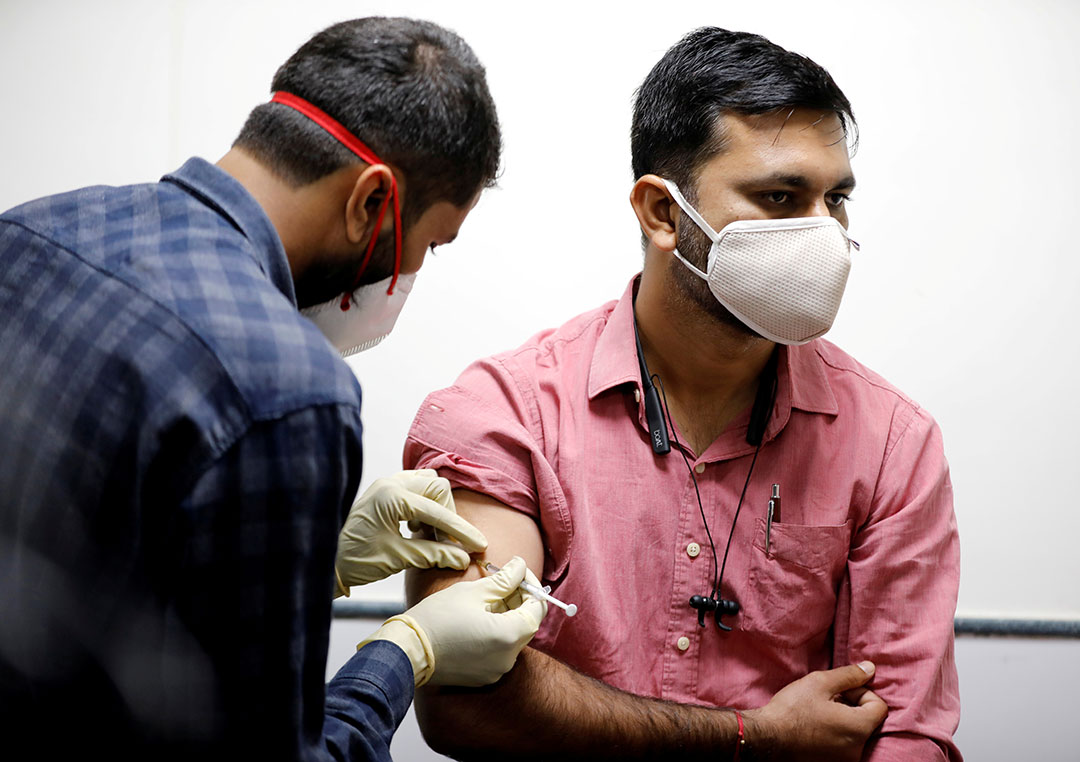Public health campaigns target false information about COVID-19 vaccinations

FORUM Staff
Misinformation and disinformation have been rampant throughout the COVID-19 pandemic. Examples range from the Chinese Communist Party and Iranian propaganda organizations distributing fake news to obscure the virus’s origin to online posts in Burma advising citizens to drink hot water to cure the infection and Bangladeshi websites perpetuating a myth that wearing a hijab prevents spread of the virus.
More must be done to counter this so-called infodemic, especially as Indo-Pacific nations begin to roll out COVID-19 immunization programs, experts said. (Pictured: A medic administers Covaxin to a health worker during trials of the COVID-19 vaccine in Ahmedabad, India, in November 2020.)
Online hoaxes, for example, could reduce public acceptance of vaccines, especially in countries such as Indonesia, where acceptance rates already hover at only about 50%, Dr. Dirga Sakti Rambe, a vaccinologist and internist, told The Jakarta Post newspaper in December 2020.
Dirga’s message is part of a campaign by Indonesia’s national COVID-19 task force to raise pandemic awareness and discourage the spread of false or unverified information on social media.
“If the public believe the hoaxes, their level of trust in other vaccines, including in regular immunization programs, will also drop. It will be dangerous. The regular immunization programs that have been going on for decades could be affected,” Dirga told The Jakarta Post.
Many Indo-Pacific nations, as well as international bodies such as the United Nations and World Health Organization (WHO), are implementing sophisticated campaigns to protect citizens from false information about the pandemic, yet public health experts contend much work remains.
In India, health officials recently unveiled a video and comic book campaign featuring Priya, the nation’s first female superhero, the Insider.com website reported. Priya, who rides a tiger and now wears a protective face mask along with her cape, has fought gender-based violence for six years. Priya is now also combating fear, isolation and stigma associated with the coronavirus as well as COVID-19 misinformation.
“Her power is simple: It’s to empower someone by speaking the truth and speaking up — even when you’re being silenced,” Priya author Shubhra Prakash told Insider.com.
WHO launched the Africa Infodemic Response Alliance in early December 2020 to team 13 international and regional organizations with fact-checking groups to counter false information around COVID-19 vaccines, among other efforts. Public health experts would like similar alliances to be launched in the Indo-Pacific.
In the United States, the Cybersecurity and Infrastructure Security Agency, part of the Department of Homeland Security, created a COVID-19 Disinformation Toolkit to help communities counter online misinformation, disinformation and conspiracy theories related to COVID-19.
WHO and other public health organizations have also been working with social media platforms to block the spread of harmful coronavirus information. Although Google, Facebook, Apple and other technology companies have tried to keep such content off their platforms, they have enabled its spread via services, tools and code they provide to other websites that promote such content, according to a December report by Oxford University’s Computational Propaganda Project.
“They’ve made the first step in doing content moderation,” Philip N. Howard, co-author of the study, “Profiting from the Pandemic,” told The Washington Post newspaper. “The next step is to withdraw the back-end services that enable COVID misinformation and fraudulent scams.”
Soon after the study was published, Google implemented information panels in search results, including for its YouTube video-sharing service, to counter false claims about coronavirus vaccines. Google also said it would provide U.S. $1.5 million to fund fact-checking research and the creation of a hub for journalists to help them access “scientific expertise and research updates” on vaccines, CNBC reported.
Facebook, meanwhile, will “reject ads with debunked claims as well as ads that discourage people from getting vaccines, including COVID-19 vaccines,” company spokesman Andy Stone told The Washington Post.
Many Indo-Pacific nations have organized fact-checking organizations and websites to vet COVID-19 information. For example, India has Boom, SM Hoax Slayer and Alt News; Sri Lanka has Fact Crescendo, Watchdog Sri Lanka and Fact Check; and Nepal has South Asia Check and Nepal Fact Check, according to the Bulletin of the Atomic Scientists website.
More aggressive action from tech platforms likely won’t eliminate COVID-19 disinformation and fraud websites, which is why public campaigns must be more robust than traditional one-way government messaging, experts said.
“Dynamic conversations and proactive messaging between public health officials and the public can be more impactful than removing false information from social media platforms, especially since removal typically occurs long after a significant number of individuals have already been exposed to the false message. A more promising approach is for public health officials and science- and health-based institutions to provide the public with a steady stream of facts,” Dr. Amir Bagherpour and Dr. Ali Nouri of the Federation of American Scientists wrote in Scientific American magazine in October 2020.




